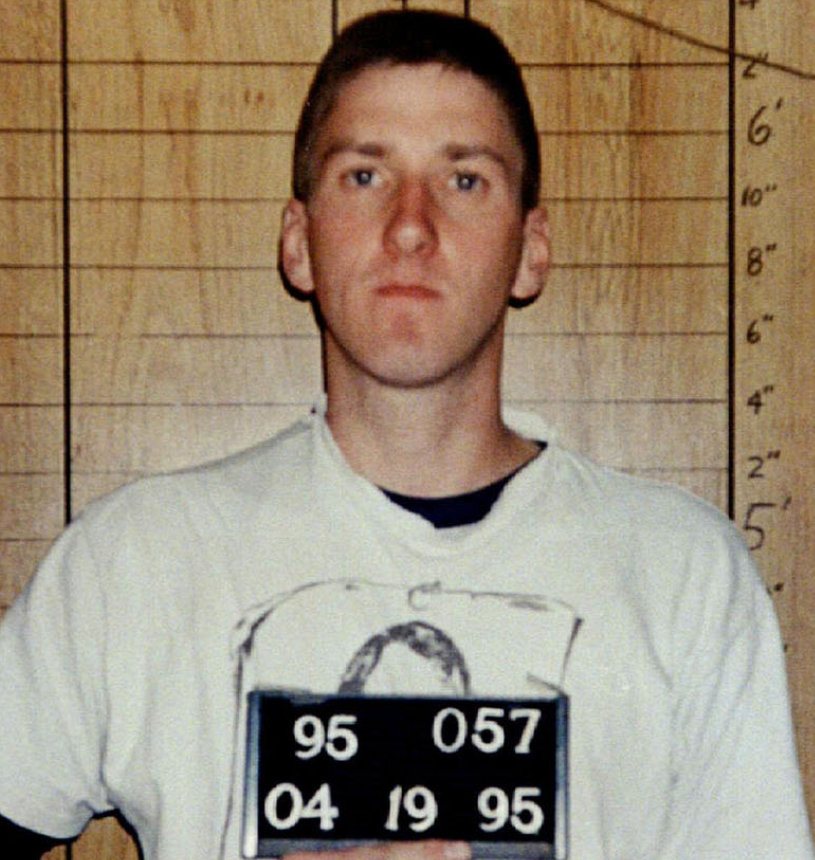Timothy McVeigh, the infamous perpetrator of the Oklahoma City bombing, was executed on June 11, 2001. This event, marking the first federal execution in 38 years, has remained a significant point of discussion in the context of domestic terrorism in the United States. Let’s dive into the details of what happened, how McVeigh’s actions led to his death, and the broader societal implications.
The Oklahoma City Bombing

The Oklahoma City bombing on April 19, 1995, remains one of the most devastating acts of domestic terrorism in U.S. history. The attack on the Alfred P. Murrah Federal Building resulted in the deaths of 168 people, including 19 children, and injured over 600 others. The bombing was carried out by Timothy McVeigh, a former U.S. Army soldier, who was motivated by his anti-government beliefs.
McVeigh’s Capture and Trial
McVeigh was captured shortly after the bombing, during a routine traffic stop for driving without a license plate. His trial began in April 1997, and he was found guilty on all 11 counts, including conspiracy to use a weapon of mass destruction and the use of such a weapon. The trial culminated in a death sentence, which was carried out four years later.
The Execution of Timothy McVeigh

Lasted Update on McVeigh’s Death
Timothy McVeigh’s death by lethal injection was executed at 8:14 a.m. ET at the Federal Correctional Complex in Terre Haute, Indiana. This execution was significant not only because it was the first federal execution in nearly four decades but also because it was the first time the U.S. government used lethal injection for this purpose.
The Execution Process
Witnesses to the execution included victims’ family members, survivors, and media representatives. McVeigh remained silent in his final moments, choosing not to make a last statement. However, he left behind a handwritten copy of the poem “Invictus,” which ends with the lines, “I am the master of my fate, I am the captain of my soul.”
The Impact of McVeigh’s Actions
What Happened After the Execution
The execution of Timothy McVeigh did not mark the end of the discourse surrounding his actions. Instead, it prompted a national conversation about domestic terrorism, the death penalty, and the role of government in preventing such tragedies. McVeigh’s case has often been cited in discussions about the effectiveness and morality of the death penalty.
Legal and Ethical Debates
The period leading up to McVeigh’s execution was marked by legal appeals and delays, notably a stay of execution due to the FBI’s late disclosure of evidence. This incident highlighted the complexities and potential pitfalls of the judicial process in capital punishment cases.
The Role of Media and Public Perception
Video Viral Moments
Media coverage of McVeigh’s trial and execution was extensive, with numerous videos going viral on platforms like CNN and major news networks. These videos captured key moments, including reactions from victims’ families and the public. The extensive media coverage played a significant role in shaping public perception of McVeigh and his actions.
Leak Video Controversy
In the years following McVeigh’s execution, there were several controversies related to leaked videos and documents pertaining to the case. These leaks often reignited public interest and debate about the bombing and its aftermath.
Remembering the Victims
While McVeigh’s actions and subsequent execution remain a focal point, it is crucial to remember the victims of the Oklahoma City bombing. Memorials and ceremonies continue to honor the 168 lives lost, ensuring that their memories are not overshadowed by the perpetrator’s infamy.
The Oklahoma City National Memorial
Established in the aftermath of the bombing, the Oklahoma City National Memorial stands as a poignant reminder of the tragedy. It serves as a place of reflection and education, helping future generations understand the impact of domestic terrorism and the importance of resilience and community.
Broader Implications of McVeigh’s Case
Domestic Terrorism in the U.S.
The Oklahoma City bombing underscored the threat of domestic terrorism, prompting changes in law enforcement practices and policies. It highlighted the need for vigilance and proactive measures to prevent such attacks.
The Death Penalty Debate
McVeigh’s execution brought the death penalty debate to the forefront. Supporters argued that it was a just punishment for his heinous crimes, while opponents viewed it as an ineffective and morally questionable response. This debate continues to influence discussions on capital punishment in the U.S.
Government and Public Safety
In the wake of the bombing, the U.S. government implemented various measures to enhance public safety and prevent future terrorist attacks. These measures included increased security protocols and the establishment of the Department of Homeland Security.
Reflection and Moving Forward
The Legacy of Timothy McVeigh
While Timothy McVeigh’s name is forever linked with one of the darkest days in U.S. history, it is important to focus on the lessons learned and the steps taken to prevent similar tragedies. The bombing and its aftermath serve as a reminder of the destructive power of hate and the importance of unity and resilience in the face of adversity.
Community Resilience
The resilience of the Oklahoma City community in the aftermath of the bombing is a testament to the human spirit. The outpouring of support and solidarity from across the nation and the world showcased the strength of collective resolve in overcoming tragedy.
Conclusion
The story of Timothy McVeigh and the Oklahoma City bombing is a complex tapestry of tragedy, justice, and reflection. As we remember the victims and their families, we must continue to strive for a society where such acts of violence are prevented, and where justice is served with fairness and compassion. The lessons learned from this dark chapter in history continue to resonate, reminding us of the enduring importance of vigilance, empathy, and resilience.
